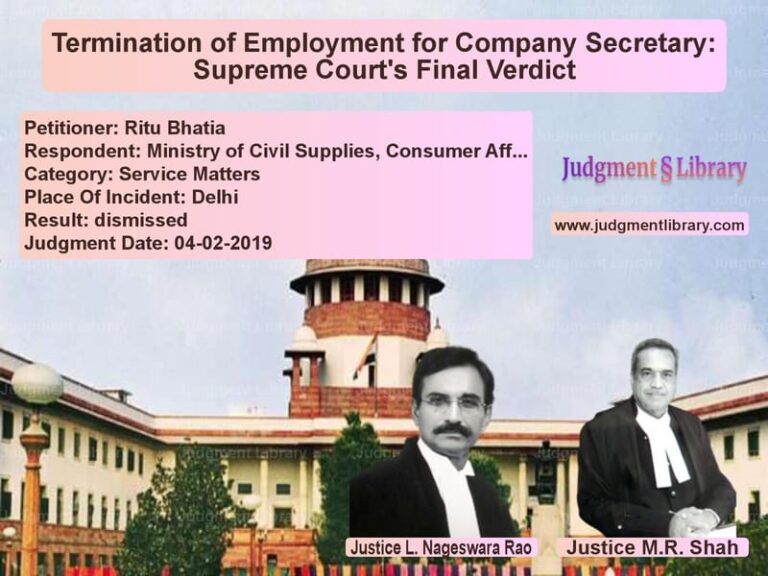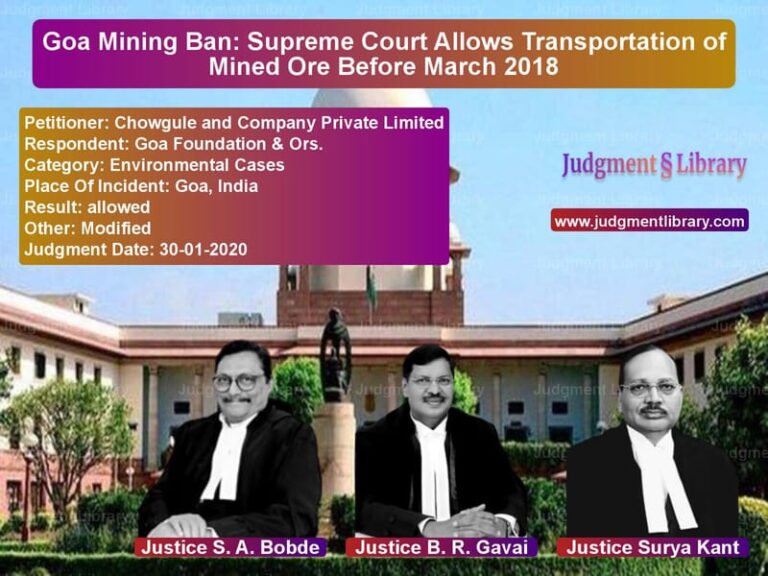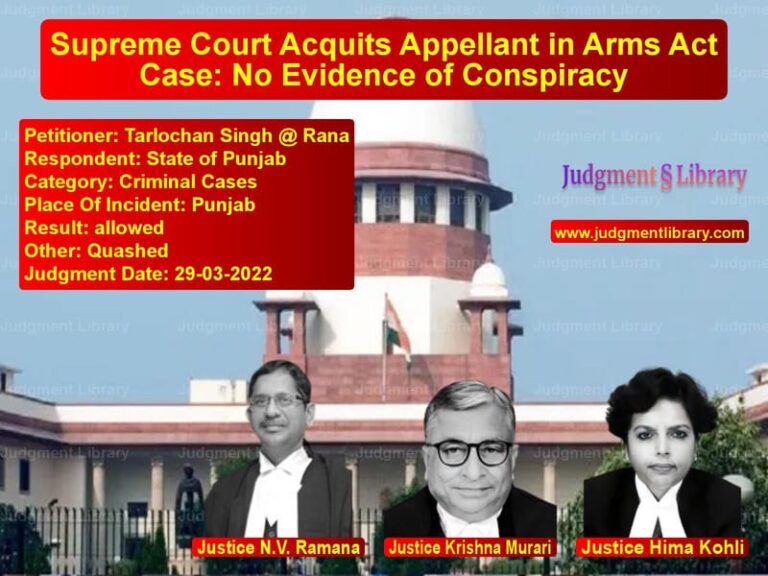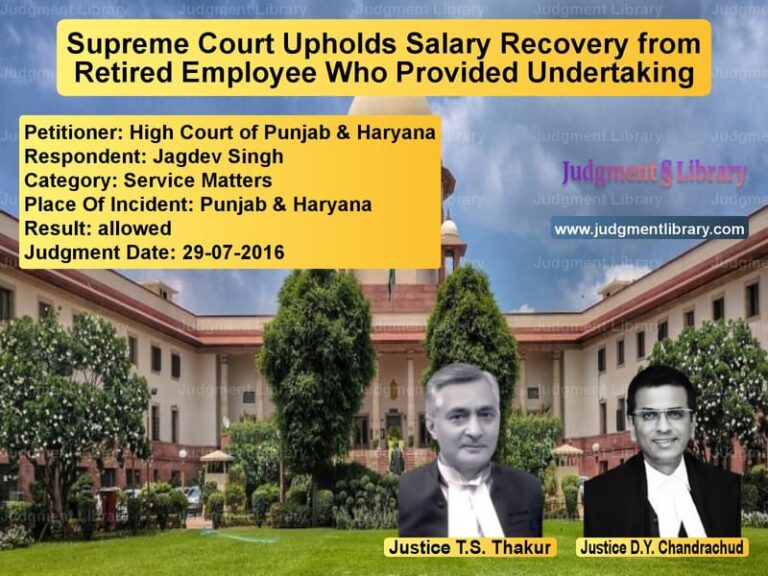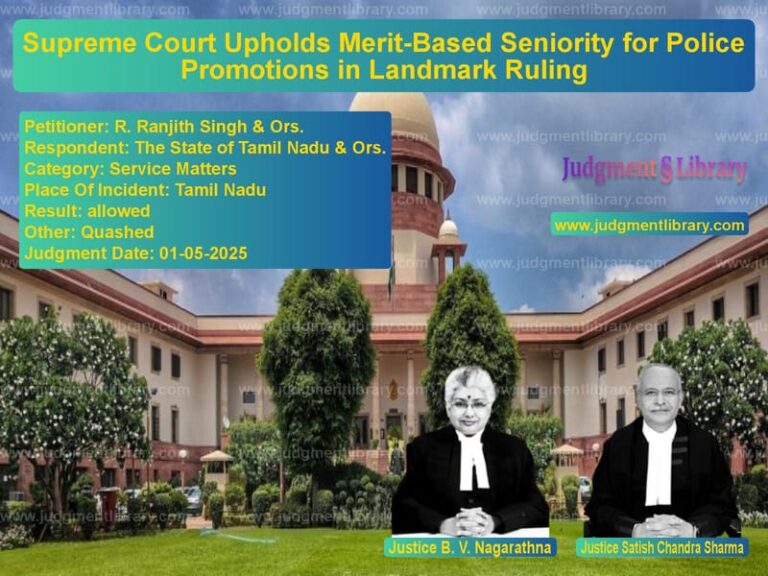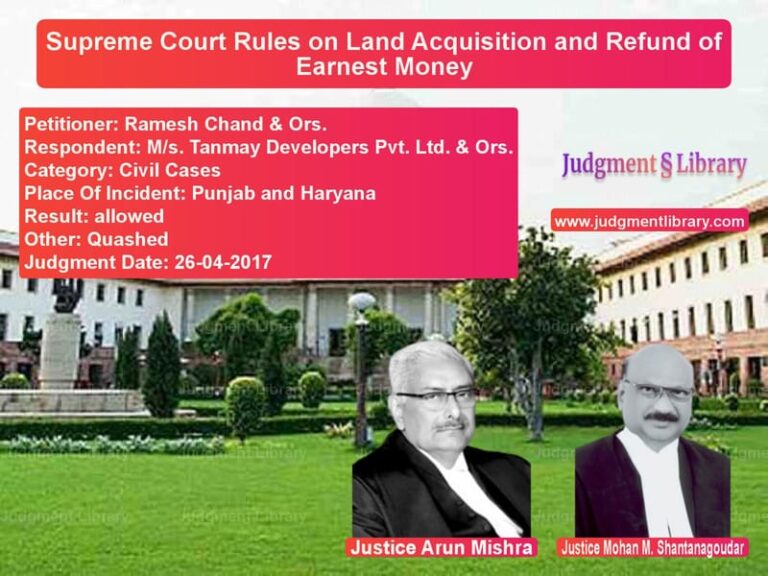Supreme Court Restores Property Sale: Validity of Sale Deed and Unilateral Cancellation Discussed
The Supreme Court in Yogendra Prasad Singh (Dead) through LRs vs. Ram Bachan Devi & Ors. ruled in favor of the appellants, restoring the validity of a sale deed executed in 1963. The Court quashed the Patna High Court’s decision that had invalidated the sale on the grounds of unpaid consideration, holding that the unilateral cancellation of the sale deed was not legally binding.
Background of the Case
The original plaintiff, Yogendra Prasad Singh, purchased land from his father-in-law, Ram Bachan Devi, via a registered sale deed dated February 4, 1963. The sale consideration was set at ₹10,000, a part of which was to be used for clearing the debts of the seller. The plaintiff claimed to have taken possession of the land and cultivated it.
However, the seller later executed a unilateral deed of cancellation in 1967 and subsequently transferred the same land via a gift deed in 1968 to his daughter, who was married to another person.
The plaintiff, having been dispossessed through legal proceedings under Section 145 of the CrPC, filed a suit seeking:
- A declaration of ownership.
- A declaration that the gift deed was fraudulent.
- Possession of the disputed land.
The trial court ruled in favor of the plaintiff, but the Patna High Court reversed the decision, holding that the sale was invalid due to non-payment of consideration.
Legal Issues Before the Supreme Court
- Whether the sale deed was valid despite the alleged non-payment of full consideration.
- Whether a sale deed could be unilaterally canceled by the seller.
- Whether the plaintiff was entitled to possession of the disputed land.
Arguments by the Appellant
The appellants, representing the legal heirs of the original plaintiff, contended:
- The registered sale deed had transferred title and possession to the plaintiff.
- The alleged unpaid consideration did not affect the validity of the sale.
- The cancellation deed was executed unilaterally without the plaintiff’s consent, rendering it invalid.
- The plaintiff had discharged the seller’s liabilities as agreed in the sale deed.
Arguments by the Respondents
The respondents argued:
- The sale deed did not operate as a transfer of title because the full consideration was not paid.
- The seller had the right to cancel the sale deed since ownership had not legally transferred.
- The plaintiff never had real possession of the property.
- The second transfer, through the gift deed, was legally valid.
Supreme Court’s Observations and Judgment
The Supreme Court, comprising Justices Abhay S. Oka and Rajesh Bindal, ruled in favor of the plaintiff, emphasizing the following key legal principles:
1. A Registered Sale Deed Transfers Ownership
“A sale deed of immovable property is executed in accordance with Section 54 of the Transfer of Property Act, 1882. Normally, upon execution of a registered sale deed, the title stands transferred to the purchaser.”
2. Non-Payment of Consideration Does Not Invalidate a Registered Sale
“Even if consideration is not fully paid, a duly executed sale deed remains valid. The seller may have a charge for unpaid consideration, but this does not invalidate the sale.”
3. Unilateral Cancellation of a Sale Deed is Invalid
“A seller cannot unilaterally cancel a sale deed once executed. The remedy for an unpaid seller is to approach the court for recovery, not to cancel the transaction on their own.”
4. Recitals in the Sale Deed Confirmed Transfer of Possession
“The sale deed specifically stated that the plaintiff was given possession as the owner and that the seller retained no further claims over the land.”
5. Gift Deed Was Not Legally Valid
“Since the seller had already transferred the land to the plaintiff, the subsequent gift deed to his daughter was legally void as he no longer had ownership rights over the property.”
Final Judgment
- The Supreme Court quashed the Patna High Court ruling and restored the trial court’s decree in favor of the plaintiff.
- The sale deed was declared valid and binding.
- The gift deed was nullified.
- The plaintiff’s legal heirs were granted possession of the land.
Implications of the Judgment
- Reinforces that a registered sale deed, once executed, transfers ownership and cannot be revoked unilaterally.
- Clarifies that unpaid consideration does not invalidate a sale, though the seller retains a charge over the property.
- Protects buyers from fraudulent cancellations and subsequent illegal transfers.
- Sets a strong precedent against unilateral cancellation deeds in property transactions.
This ruling safeguards the rights of buyers and prevents sellers from taking undue advantage of alleged unpaid considerations to reclaim sold properties.
Petitioner Name: Yogendra Prasad Singh (Dead) through LRs.Respondent Name: Ram Bachan Devi & Ors..Judgment By: Justice Abhay S. Oka, Justice Rajesh Bindal.Place Of Incident: Patna, Bihar.Judgment Date: 30-07-2023.
Don’t miss out on the full details! Download the complete judgment in PDF format below and gain valuable insights instantly!
Download Judgment: yogendra-prasad-sing-vs-ram-bachan-devi-&-or-supreme-court-of-india-judgment-dated-30-07-2023.pdf
Directly Download Judgment: Directly download this Judgment
See all petitions in Property Disputes
See all petitions in Contract Disputes
See all petitions in Succession and Wills
See all petitions in Judgment by Abhay S. Oka
See all petitions in Judgment by Rajesh Bindal
See all petitions in allowed
See all petitions in Quashed
See all petitions in supreme court of India judgments July 2023
See all petitions in 2023 judgments
See all posts in Civil Cases Category
See all allowed petitions in Civil Cases Category
See all Dismissed petitions in Civil Cases Category
See all partially allowed petitions in Civil Cases Category


